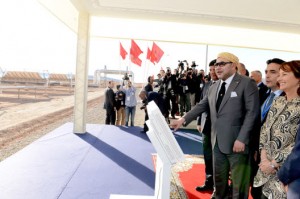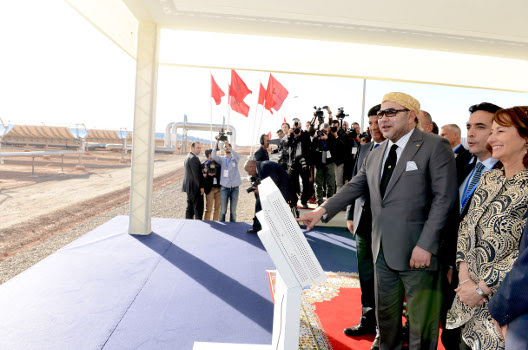Atlantic Counsel
by Youssef Amrani

H.M. King Mohammed VI inaugurates the Noor Solar Project near Ourzazate. Morocco is a major player in renewable energy. Photo credit: MAP.
Since the tumult of the Arab Spring in 2011, the broader Middle East and North Africa region has grappled with instability, internal strife, and an existential struggle against extremist terrorism.
The region has descended from the great hope for change into a spiral of fragmentation, insecurity, and fragility, and it continues to face complex emergency situations on an unprecedented scale. The conflicts cause untold damage to both human life and physical infrastructure, as fifteen million people to date have fled their countries. Syria today is an increasingly fragmented nation and the humanitarian situation there remains extremely challenging.
The picture is no brighter in Iraq, where the deteriorating security situation has caused new waves of internal displacement. In Libya, only a political solution, inclusive dialogue, and democratic and representative institutions, within the framework of Libyan national unity, territorial integrity, and sovereignty can resolve the crisis. (It was in recognition of this imperative that the warring Libyan parties agreed in December to the formation of a Government of National Unity during talks hosted in Skhirat, Morocco.)
Power vacuums, porous borders, and fragile states have enabled new, dangerous players to gain momentum and territory across the region. Proliferation of such non-democratic and violent forces in the region is a serious threat to the ideals of all nation-states. These forces are intent on constructing alternate political realities.
These geopolitical challenges confirm that no one state or multilateral actor, however powerful it may be, can impose an end to these crises. They are also a reminder that military interventions not backed up by post-conflict political support have led to major crises, not only in the countries concerned but also in broader regional contexts.
Within this difficult regional context, Morocco, under the leadership of H.M. King Mohammed VI, chose its own path and resolved to consolidate its democracy. Indeed, at a time when political transitions often take place amid tense conflict situations, Morocco has pressed ahead with its political agenda, endeavoring to foster a liberal, multiparty environment conducive to strengthening the rule of law while displaying a firm commitment to international democratic principles, in harmony with the country’s traditions of tolerance and openness.
The Moroccan global approach is unique in that it capitalizes on four elements: stability, vision, effective transformation, and commitment to international cooperation.
Stability. There are a number of key factors which make Morocco’s path toward democracy unique and successful, including its longstanding commitment to building democracy and to modernity, political pluralism, and economic liberalism.
The new constitution adopted in July 2011 enshrined this reform process in law, confirming its irreversible nature. This has resulted in a homegrown reform process, built with an emphasis on inclusiveness, participation, and ownership, all of which ensure its long-term sustainability.
Morocco has always considered change an opportunity for improvement, rather than wasting time and effort resisting it. In this respect, the advanced regionalization plan to promote integrated and sustainable development reflects Morocco’s commitment to building a strong and diversified national economy which can generate wealth, create jobs, and achieve social justice for all.
Morocco has reached such a level of institutional consolidation that the vast majority of the citizens and the relevant political, social, and civil society actors are ready and willing to contribute to the country’s development through its institutions, which is a major step in Morocco’s democratic transition process.
Morocco has also made significant progress in economic development. Despite challenges due to the recent international economic crisis, Morocco has achieved commendable growth over the past decade, as it seeks to develop enhanced access to basic services, education, healthcare, and wealth-generating activities for all its citizens.
Vision. The vision for Morocco’s future is built on the idea of participatory and inclusive democracy, and takes into account the country’s unique identity and needs. King Mohammed VI has a clear vision, which seeks to address all aspects of human development by promoting both economic and political development. Efforts to build a modern society included the adoption of several major sectoral strategies: the “Green Plan,” which aims to create 1.5 million additional jobs in the agricultural sector by 2020; the “Emergence Plan,” which lays out a roadmap for high-growth sectors like aerospace and food and textile processing likewise by 2020; and “Vision 2020,” which aims to double the number of tourists visiting Morocco in the same period of time.
Morocco has valuable assets to bring to bear on the promotion of these industries, including its strategic geographical position, world-class infrastructure, and skilled and competitive workforce. The country offers strong incentive packages and financial support to attract international investors. Moreover, Morocco is closely connected to Europe and enjoys an “Advanced Status” with the European Union (EU). Thus, beyond the strategic dimension and the logic of free trade between the two parties, Morocco seeks greater integration of its political, economic, and social structures with those of the EU.
Transformation. With an eye on enhancing Morocco’s competitiveness, the country is keen to upgrade its infrastructure, including through new and expanded ports, highways, high-speed rail lines, and improve its logistics and energy capabilities. The “Emergence Plan” focuses on Morocco’s industries, and especially on enabling a thriving automotive and aeronautics sector that will create additional jobs and economic growth.
Morocco has also emerged as a major player in the global transition to renewable energy. With the goal of a cleaner energy future, Morocco is pioneering cutting-edge solar technology. The Noor Solar Project, a program aiming to develop 42 percent of the nation’s electricity from renewable sources by 2020, will further grow local energy industries. The recent inauguration by King Mohammed VI of the project near Ourzazate—the world’s largest concentrated solar power plant—is an example of the country’s commitment to the agreement reached at the United Nations Climate Change Conference (COP 21) in Paris in December of last year. Morocco has the honor of hosting the next summit, COP 22, later this year in Marrakech.
Commitment to international cooperation. Morocco’s foreign policy is based on the same guiding principles as those which have inspired its internal process: openness to the outside world, an attachment to moderation and tolerance, a commitment to human development, and a spirit of global cooperation.
Today, Morocco’s voice of reason is more necessary than ever in an unstable regional environment. The country is deeply aware of these threats, not least because Morocco’s geography has placed it at the forefront of many interconnected challenges, including everything from trans-border criminality to terrorism, or more worryingly, the collision of both these worlds—a phenomenon that is increasingly revealing itself in the Sahel.
In all its external policies, Morocco is a firm believer in the importance of cooperation. Morocco was the first southern partner of the EU, opening the door to further cooperation on political and economic issues. The country also has deep and enduring bilateral alliances, as Morocco was the first country in the world to recognize the United States as an independent nation. The two countries now share a Free Trade Agreement—the only one America has with any country on the African continent—and Morocco is a designated a “major non-NATO ally” for the United States.
Morocco’s Africa policy stems from the deep conviction that, in addition to human development programs, Africa needs more mutually beneficial partnerships. King Mohammed VI believes that models of cooperation which rest on a win-win vision, such as South-South cooperation, will enable the continent to stand on its own feet.
Last but not least, the international community’s trust in Morocco allows the country to move forward its development model. Foreign investment in Morocco, for example, reached a record level in 2013. Additionally, financial markets allowed the country to raise financing at very attractive rates confirming the positive appreciation of the International Monetary Fund and the support of the World Bank that raised its credits to the country for the next four years (from $750 million annually to $1 billion).
Stability, vision, transformation, and cooperation have been decisive factors in shaping the unique Moroccan democratic experience. While others in the region continue to fear change and seek stability through adherence to the status quo, Morocco embraces proactive change as the guarantor of long-term stability.
For these reasons, and despite all the difficulties it may encounter, Morocco keeps moving forward.
Youssef Amrani is Chargé de Mission in the Royal Cabinet of H.M. King Mohammed VI. He previously served as Morocco’s Minister-Delegate of Foreign Affairs and Cooperation and as Secretary General of the Mediterranean Union.







